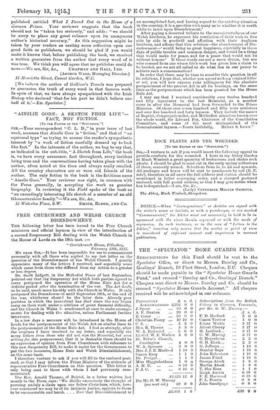FREE CHURCHMEN AND WELSH CHURCH DISEND 0 W MEN T.
Tan following letter has been issued to the Free Church ministers and official laymen in view of the introduction of a second Suspensory Bill dealing with the Welsh Church in the House of Lords on the 18th inst. :—
" Corrietrueorr Mouse, Pitiochry, February 11th, 1915. MY DEAR SIR,—It has been impossible for me to communicate personally with all those who replied to my last letter on the question of the Disendowment of the Welsh Church. I greatly appreciate many of the letters I received, and especially some which came from those who differed from my action to a greater or less degree.
Dr. Scott Lidgett, in the Methodist Time, of last September, pointed out that the Suspensory Act which both parties agreed to carry postponed the operation of the Home Rule Act for a definite period after the termination of the war. The Act dealt, as he said, much more harshly with the Church in Wales. It only postponed the Disendowinent until September 18th, or the end of the war, whichever should be the later date. Already poor parishes in which the incumbent has died since the war' began carry on their work under conditions of great financial difficulty, and the Church in Wales is condemned at once to make arrange- ments for dealing with the situation, unless Parliament further intervenes.
In a few days a measure will be introduced in the House of Lords for the postponement of the Welsh Act on similar lines to the postponement of the Home Rule Act. I feel so strongly, after the response I have received to my letter, and especially the many letters from those who did not sign the Memorial, but were willing for this postponement, that it is desirable there should be an expression of opinion from Free Churchmen with reference to this new Suspensory Bill, to make it easier for the Government to put the two measures!, Home Rule and Welsh Disestablishment, on the same basis.
I therefore venture to ask if you will fill in the enclosed post. card, so that I may inform the Prime Minister of the attitude of representative Free Churchmen on this question. This letter is only being sent to those with whom I had previously com- municated.
The Rev. Arnold Thomas, of Bristol, in a letter written last month to the Press, says: 'We dislike excessively the thought of pressing unduly a claim upon our fellow Christians, which, how- ever convinced we may be of its intrinsic justice, appears to them to be unreasonable and harsh. . . Now that Disestablishment is an accomplished fact, and having regard to the existing situation in the country, it is a question with many as to whether it is worth while to insist upon Disendowment!
After paying a deserved tribute to the warmheartedness of our Welsh brethren, he expresses his conviction of their Isiah to live side by side in goodwill and affection wills their Anglican brethren, and affirms that this solution—the abandonment of Dis- endowment= would bring us great happiness, especially in these days of public trouble and common danger, and would be a thing that would make for peace, and for a peace that would not be without honour.' If these words are not a mere dream, but aro wise counsel from one whose life's work has given him a claim to be heeded, are we not all called to do what lies in our power to achieve such a consummation?
In order that there may be time to consider this question in all its relations, I hope that, whether you agreed with my original letter or not, you will now express your willingness for the absolute postponement of the present Act in all its bearings, on the same lines as the postponement which has been granted for the Homo Rule Act.
I may any that I received considerably over twelve hundred and fifty signatures to the last Memorial, as a number came in after the Memorial had been forwarded to the Prime Minister. Of these over seven hundred and fifty were ministers and over five hundred and forty laymen. They include the names of Baptist, Congregationalist, and Methodist ministers known over the whole world, Sir Edward Fry, Chairman of the Conciliation Committee, and verse of the most distinguished of the Nonconformist laymen.—Yours faithfully, Iltunv S. LUNN."






































 Previous page
Previous page